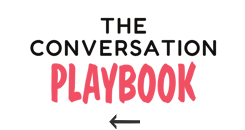
The Conversation Playbook FAQs:

Absolutely. This isn't about changing your personality. It's about equipping you with skills. Think of it like a cookbook: you're not a bad person if you don't know how to cook a new recipe, you just need a good guide. We give you the "recipes" for conversation so you can develop your interpersonal skills, on your own terms.
You can learn theory for free, but mastery requires practice. Free advice often stops at "what" to do (e.g., "be a better listener"). Our Playbook gives you the "how," with 400+ real-world examples and frameworks to actively practice. It's the difference between reading about a workout and having a personal trainer with a structured plan.
This is a common and important concern. We don't teach rigid scripts. We teach flexible communication frameworks and principles (like the "Fact + Feeling" formula in our blog). It's like learning the grammar of a language. It doesn't tell you what to say, it gives you the structure to express your own thoughts clearly and effectively. The goal is to sound more like you, not less.
Because this is 100% action. Many social and interpersonal skills resources are 90% stories and theory. Our system is built around immediate, hands-on practice with flashcards. You're not just reading about connection; you're actively rehearsing for it in a low-pressure way, which builds real, muscle-memory confidence.
We process and ship orders every weekday (Monday through Friday), excluding national holidays.
If you place your order on a Saturday or Sunday, we'll get it packaged up immediately, but it will be dropped off at the carrier and receive its tracking scan first thing Monday morning.
You will receive your official tracking number via email as soon as the carrier confirms acceptance on Monday.





